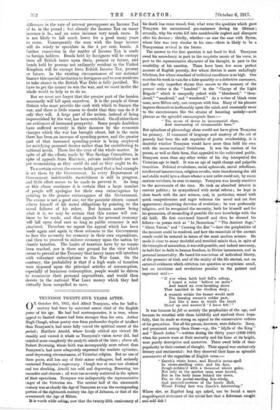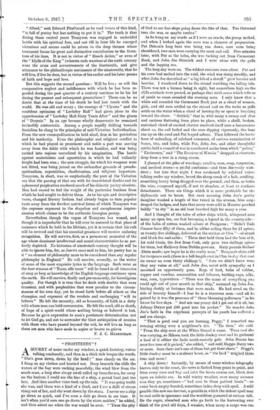TENNYSON TWENTY-FIVE YEARS AFTER.
ON October 8th, 1892, died Alfred Tennyson, who for half-a. century had been by universal assent chief of the English poets of his age. He had had contemporaries, it is true, whose appeal to limited classes had been stronger than his own. Arthur }high Clough, whose poetry rose front profounder depths of intellect than Tennyson's, had more fully voiced the spiritual unrest of the period ; Matthew Arnold, whose keenly critical eye viewed life steadily and viewed it whole as Tennyson's vision never did, had eatisfied more completely the analytic minds of the time ; above all, Robert Browning, whose faith was incomparably more robust than Tennyson's, had more adequately expressed the resolute optimism, amid depressing circumstances, of Victorian religion. But no one of these poets, still less any of their minor colleagues, had seriously contested Tennyson's supremacy. Clough was at once too classical and too shocking, Arnold too cold and depressing, Browning too recondite and obscure ; all were too severely restricted in the sphere of their operations. Tennyson was indisputably the representative singer of the Victorian era. The central half of the nineteenth century was as clearly the Age of Tennyson as was the eorreeponding portion of the eighteenth century the Age of Johnson, or that of the seventeenth the Age of Milton.
It is worth while asking, now that the twenty-fifth anniversary of
his death hag come sound, first, what were the qualities which gave Tennyson his uncontested pre-eminence during his lifetime ; secondly, why his works fell into considerable neglect and disrepute after his decease ; thirdly, whether—as was the case with Byron, whose fate was very similar to his own—there is likely to be a Tennysonian revival in the future.
The answer to the first question is not hard to find. Tennyson owed his ascendancy in part to the exquisite musio of his verse, in part to the representative character of his thought, in part to the sensibility of his emotion. There have been few more perfect masters of English prosody, few whose diction is more unfailingly felicitous, few whose standard of technical excellence is so high. One searches his work in vain for a fare quantity or a defective assonance, and the only imperfect rhyme that occurs to the memory of the present writer is the " hundred " in the "Charge of the Light Brigade" which is unequally yoked with "blundered," thun- dered," " sundered," and wondered." As a writer of blank verse none, save Milton only, can compare with him. Many of his phrases impress themselves ineffaceably upon the mind, and constantly recur to the consciousness like the strains of haunting melody—such phrases as the splendid onomatopoeic lines :—
" The moan of doves in immemorial elms, And murtnuring of innumerable bees."
But splendour of phraseology alone would not have given Tennyson his primacy. If command of language and mastery of the art of prosody had been the sole requisites of poetic overlorclahip, it is doubtful whether Tennyson would have more than held his own with the unconventional Swinburne. It was the content of his poems, as well as their form, that appealed to the cultivated public. Tennyson more than any other writer of his da,y interpreted the Victorian age to itself. It was an ago of rapid change and palpable transition. Political revolutions, social upheavals, moral rebellions, intellectual insurrections, religious revolts, were transforming the old and stable world into a chaos whence a new order could not, by many anxious watchers, be seen to emerge. Tennyson was keenly sensitive to the movements of the time. He took an absorbed interest in current polities; be sympathized with social reform ; be kept in dose touch with the new science, and, in particular, seized with quick comprehension and eager welcome the novel and (at first appearance) disquieting doctrine of evolution ; he was profoundly religious, and he recognized the necessity, both for himself and for his generation, of reconciling if possible the new knowledge with the old faith. He first convinced himself and thou he allowed his fellows—in poems such as " ,Mernoriam," "The Ancient Sage," "Silent Voices," and "Crossing the Bar "—how the perplexities of the moment could be resolved, and how the essentials of the ancient creeds could he restated in terms of the most modem science. He made it clear to many doubtful and troubled minds that, in spite of the triumphs of naturalbun, it was still possible, and indeed necessary, to hold fast to faith in human freedom, in Divine immanence, and in personal immortality. He based his conviction of individual liberty, of the presence of God, and of the reality of the life eternal, not on external evidences which criticism can question or scepticism assail, but on intuitions and revelations peculiar to the patient and expectant soul :—
" If e'er when faith had fall'n asleep,
I heard s voice 'believe no mere'
And heard an ever-breaking shore -That tumbled in the Godless deep; A warmth within the breast would melt The freezing reason's colder part, And like a man in wrath the heart Stood up and answer'd 'I have felt.'"
It was because he felt so acutely the perplexities of the age, and because he wrestled with them faithfully and resolved them hope- fully, that he made so strong an appeal to the conservative culture of his generation. Not all his poems, however, were didactic. Many, and prominent among them those--e.., the "Idylls of the King" and "Enoch Arden "—written during the thirty years (1880-1880) when his powers were at their maturity and his fame at its height, were purely descriptive and narrative. These owed little of their popularity to their content of thought. Their appeal was exolueively literary and sentimental : but they deserved their fame as splendid monuments of the capacities of English verse:—.
" Snoeh's white home, and Enoch's ocean.spoll In ocean-smelling osier, and his face, Rough-redden'd with a thousand winter gales. Not only to the market cross were known, But in the leafy lance behind the down, Far as the portal.warding lion-whelp, And peacock-yewtree of the lonely Hall, Whose Friday fare was Enoch's ministering."
Where else, as Bagehot long ago asked, can be found a more magniloquent statement of the trivial fact that a fisherman caught and sold fish
"Alfred," said Edward MeGerald as he read verses of this kind, " is full of poetry but hag nothing to put it in." The tenth is that during these central years Tennyson was engaged in undecided battle with his spiritual foes, and not till in later life be emerged victorious and serene could he return to the deep themes whose treatment forms his great and distinetive contribution to the litera- ture of his time It is not in virtue of "Enoch Arden," or even of the" Idylls of the King" (wherein rude warriors of the sixth century wear the arms and accoutrements of the fourteenth, and give utterance to the philanthropic sentiments of the nineteenth), that he will live, if live he does, but in virtue of his earlier and his later poems of faith and hope and love.
But this suggests the second question : Will he live ; or will the comparative neglect and indifference with which he has been re- garded during the past quarter of a century continue to be his lot during the-present and subsequent generations ? There can be no doubt that at the time of his death he had lost touch with the world. He was old and weary ; the courage of " Ulysses " and the confident optimism of " Looksley Hall" had given place to the apprehension of " Lockeley Hall Sixty Years Alter" and the gloom of "Despair." In an age become wholly democratic he remained invincibly aristocratic. Among a people rapidly drifting towards Socialism he clung to the principles of mid-Victorian Individualism. From the new cosmopolitanism he held aloof, firm in his patriotism and his insularity. Even the philosophic and religious conflict in which he had played so prominent and noble a part WA moving away from the fields with which he was familiar, and was being carried into regions unrealized by his imagination. The battle against materialism and agnosticism in which he had valiantly fought had been won ; the new struggle, for which his weapons were not fitted, was being joined on the unfamiliar grounds of pseudo. spiritualism, superstition, charlatanism, and religious imposture. Tennyson, in short, was so emphatically the poet of the Victorian era that the passing of that era with its traneitional doubts and its ephemeral perplexities rendered much of his didactic poetry obsolete. Men had ceased to feel the weight of the particular burdens from which he had sought to deliver them. As to his epic and descriptive verse, changed literary fashion had already begun to tarn popular taste away from the flawless metrical forms of which Tennyson was the supreme exponent to the shapeless and cacophonous impres- sionism which claim, to be the authentic Georgian poetry.
Nevertheless, though the vogue of Tennyson has waned, and though it is improbable that he will ever be restored to that place of eminence which he held in his lifetime, yet it is certain that his cult will be revived and that his essential greatness will receive enduring recognition. He will survive, first, as a permanent memorial of the age whose dominant intellectual and moral characteristics been per- fectly depicted. No historian of nineteenth-century thought will be able to ignore him, for, as Jowett once said to him, his poetry has in it" an element of philosophy more to-be considered than any regular philosophy in England." He will survive, secondly, as the writer of some of the most exquisite lyrics in the language. Such versa as the four stanzas of "Tears, idle tears" will be found in all treasuries of song as long as knowledge of the English Language continues upon the earth. He will survive, finally and pre-eminently, for hisreligiona quality. For though it is true that he dealt with doubts that were transient, and with perplexities that were peculiar to the circum- starroes of his own day, yet he stood forth before all others as the champion and exponent of the resolute and unchanging" will to believe." Ile felt the necessity, old as humanity, of faith in a deity with whom man can hold conummion. He felt the need, old as death, of hope of a spirit-world where nothing hiving or beloved is lost. Because he gave expression to man's passionate determination not to let God go, and not to surrender the blest anticipation of reunion with those who have passed beyond the veil, he will live as long as there are men who have souls to aspire or hearts to grieve.
F. J. C. HFARNSHLW.





























 Previous page
Previous page